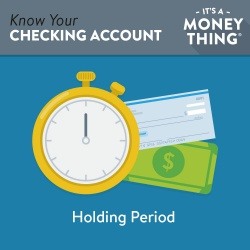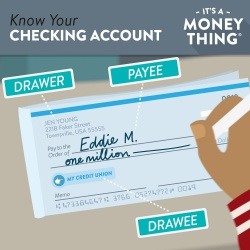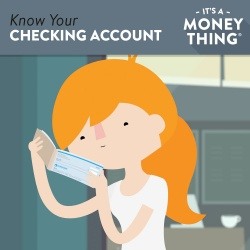Are Checks Obsolete?
Checks hold an odd place in our personal finances. In many ways, checks seem like relics from a previous era. We maybe write one or two checks a month (usually for rent or similar bill-paying situations where electronic payment simply isn’t an option). This is vastly different from only a few decades ago, when checks represented more than 85% of all non-cash retail payments. (Can you imagine whipping out a checkbook in line at the grocery store? Times have certainly changed!)
However, despite their gradual decline in use, checks haven’t become completely extinct. We still keep our money in checking accounts, we still balance our checkbooks, and new banking technologies (mobile check imaging is one example) are being introduced to improve the process of paying by check. Writing checks continues to walk the line between permanence and obsolescence.
Whether or not checks are on their way out, there are still a couple of check-related best practices that you need to be aware of in order to stay on top of your finances.
 Holding periods exist, and you need to keep track of them
Holding periods exist, and you need to keep track of them
Checks often get a bad rap for the amount of time they take to clear. This is referred to as a holding period, and it can vary anywhere from a day to over a week, depending on your financial institution.
The clearing process itself is made up of several steps. First, the financial institution that receives the check for deposit encodes its dollar amount into the machine-readable numbers along the bottom of the check. Then the physical check is fed through a machine that scans its data. That data is then sent to a clearinghouse, which forwards the information to the financial institution that issued the check. The financial institution makes sure the check-writer’s account has sufficient funds to make the payment—if it does, the transaction goes through, but if the account has insufficient funds to complete the transaction, the check bounces.
Check clearing might sound like a long and overly complicated process, but it has come a long way. In 18th century England, the check clearing process was considerably less efficient. It involved clerks from each London bank meeting up at a tavern on Lombard Street to exchange checks and settle account differences—not the most scalable process!
The introduction of mobile check imaging (also known as remote deposit capture) and other technologies is helping to shorten the holding period; however, to avoid fees, bad checks and other sticky situations, it’s still important for you to understand what the holding period is at your credit union or bank.
 If you’re the check writer: the holding period, combined with some absentmindedness, can create a situation where you’re spending money in your account that you don’t actually have. For this reason, when you write a check, it’s best to pretend that the related amount of money is already gone from your account.
If you’re the check writer: the holding period, combined with some absentmindedness, can create a situation where you’re spending money in your account that you don’t actually have. For this reason, when you write a check, it’s best to pretend that the related amount of money is already gone from your account.
If you’re the check receiver: keep in mind that when you deposit a check and the money shows up in your account, the check may not have cleared yet. Your financial institution may allow you to spend a portion or all of that deposited check, but if it bounces, you would be the one responsible for repaying any funds you used before the check bounced. It’s a good practice to confirm that a check has cleared before spending it. When in doubt, you can always give your financial institution a call to verify the status of a check.
Balancing a checkbook is still an important skill
The best way to avoid tricky scenarios created by holding periods is to keep track of your transactions with a checkbook register. Traditionally, checkbook registers are those lined notebooks that come with your checks, but you can use any system that works for you, whether that’s a printable form, a digital spreadsheet or even an app on your phone.
Recording your transactions as you go will give you a more accurate idea of your account balance and help you avoid unnecessary fees or overdraft charges. It also takes the guesswork out of writing a check or making an ATM withdrawal—you will know whether or not you have the money in your account to cover it. Comparing your checkbook register to your monthly statements also makes it easier for you to spot any errors or fraudulent charges.
 Start by recording all your checking account transactions in your checkbook register—debit card payments, checks written and received, and ATM withdrawals. Include online bill payments and direct deposits too—since those are sometimes automated, it can be easy to forget them. When you get your monthly statement, compare each transaction to your checkbook register and put a check mark next to each transaction that matches your statement. If items in your statement do not match your checkbook register, figure out what’s at cause. Sometimes it’s an entry error or a slip-up in your math, but it could be an error by your financial institution.
Start by recording all your checking account transactions in your checkbook register—debit card payments, checks written and received, and ATM withdrawals. Include online bill payments and direct deposits too—since those are sometimes automated, it can be easy to forget them. When you get your monthly statement, compare each transaction to your checkbook register and put a check mark next to each transaction that matches your statement. If items in your statement do not match your checkbook register, figure out what’s at cause. Sometimes it’s an entry error or a slip-up in your math, but it could be an error by your financial institution.
Since we are not yet a totally digital society, understanding how to use paper checks as well as keeping track of all of your transactions will keep your checking account in the black and your financial matters running smoothly.
Activity

Was this information useful? Visit our It's A Money Thing home page for more quick videos and helpful articles to help you make sense of your money, one topic at a time! Check back, new topics will be introduced regularly.





 Holding periods exist, and you need to keep track of them
Holding periods exist, and you need to keep track of them If you’re the check writer: the holding period, combined with some absentmindedness, can create a situation where you’re spending money in your account that you don’t actually have. For this reason, when you write a check, it’s best to pretend that the related amount of money is already gone from your account.
If you’re the check writer: the holding period, combined with some absentmindedness, can create a situation where you’re spending money in your account that you don’t actually have. For this reason, when you write a check, it’s best to pretend that the related amount of money is already gone from your account. Start by recording all your checking account transactions in your checkbook register—debit card payments, checks written and received, and ATM withdrawals. Include online bill payments and direct deposits too—since those are sometimes automated, it can be easy to forget them. When you get your monthly statement, compare each transaction to your checkbook register and put a check mark next to each transaction that matches your statement. If items in your statement do not match your checkbook register, figure out what’s at cause. Sometimes it’s an entry error or a slip-up in your math, but it could be an error by your financial institution.
Start by recording all your checking account transactions in your checkbook register—debit card payments, checks written and received, and ATM withdrawals. Include online bill payments and direct deposits too—since those are sometimes automated, it can be easy to forget them. When you get your monthly statement, compare each transaction to your checkbook register and put a check mark next to each transaction that matches your statement. If items in your statement do not match your checkbook register, figure out what’s at cause. Sometimes it’s an entry error or a slip-up in your math, but it could be an error by your financial institution.


